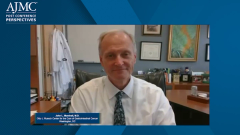
Maximizing Patient Quality of Life through Shared Decision Making in Metastatic Colorectal Cancer
Discussion on shared decision making with patients with later stage refractory metastatic colorectal cancer as well as maximizing a patient's quality of life.
Episodes in this series

SEGMENT 2
SEGMENT TITLE:Maximizing Patient Quality of Life Through Shared Decision-Making in mCRC
SEGMENT DESCRIPTION:Discussion on shared decision-making with patients with later-stage refractory metastatic colorectal cancer as well as maximizing a patient’s quality of life.
John L. Marshall, MD: Adding bevacizumab to this regimen is easy. In our way of thinking, it doesn’t change. It reassures us that what we’re seeing in clinic also goes along with the data in the randomized study. It’s a pretty easy regimen to add in for these patients. It can be given every 2 or 3 weeks. There’s some flexibility on that. In terms of decision-making for patients, they’re looking for the best option possible in all settings. They want to live as long as they can, and they want their quality of life to be as good as it can. We also have to remember that patients in this refractory setting are more cognizant of their quality of life. They’re less about being aggressive and more about being effective. These data are completely in line with what we see in the clinic and the decision-making process. Patients are in on this too.
We don’t go home with the patients. But when they’re coming to see us, they’re putting on their best face. When assessing this, I’ll look to the spouse or significant other or daughter who’s in the room as the patient is telling me how they’re doing. I’ll say, “Is this really what’s going on at home?” You’ll often get a different perspective from the individual sitting next to them. I’ll ask patients what they do for fun. Have they had any fun since I last saw them? Or are they sitting around the house waiting for the next appointment? There are quick ways that physicians can assess that other than the day-of-clinic quality of life. In terms of maximizing quality of life, 1 of the mistakes we make in GI [gastrointestinal] cancers is that we push doses too hard. There’s not a lot of evidence that high or maximum doses are required. We want to make sure and optimize the dose and the schedule for the patient in front of us. We want to give them their chances for breaks and take an extra week off here or there as needed. Remember, they’re in this—year in and year out, coming to see you every couple of weeks. It could be nice to take a break now and then, just as we all need a vacation from work. Do a good job of assessing, then optimize the dose and schedule as best you can for the patient in front of you.
Transcript edited for clarity.
Newsletter
Stay ahead of policy, cost, and value—subscribe to AJMC for expert insights at the intersection of clinical care and health economics.










